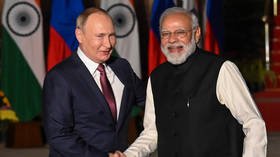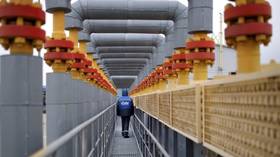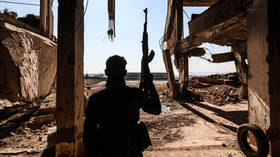Why India sees Russia as a unique partner

Monday’s India-Russia summit, which resulted in the signing of 28 agreements, has left no doubt that, for New Delhi, Moscow is as important as any of its key partners in the West, Asia or Oceania.
The visit of Russian President Vladimir Putin to India on December 6 for the 21st annual bilateral summit was only his second overseas trip since the coronavirus pandemic halted in-person diplomatic travel. Indian Prime Minister Narendra Modi acknowledged the significance of Putin’s choice, saying, “Your love towards India is evident.”
While close relations between Moscow and New Delhi go back several decades, and the two countries’ leaders have met regularly to promote their “special and privileged strategic partnership,” the novelty this time was that the Russian Foreign and Defence Ministers Sergey Lavrov and Sergey Shoigu were also present in the Indian capital to meet their Indian counterparts in the new format of a ‘2+2’ dialogue.
The fact that India had engaged in 2+2-level talks only with the United States, Japan and Australia prior to Russia left little doubt that, for New Delhi, Moscow remains no less important than any of its Western partners or their allies in Asia and Oceania.
A sharp-edged partnership
Modi’s comment that the 2+2 was an innovation for “practical cooperation” with Russia, and the Indian External Affairs Minister S. Jaishankar’s remark that the 2+2 with Russia would deepen coordination on “politico-military issues that are interrelated and cross-cutting”, suggested this age-old friendship was being given a sharper edge.
With the combined Foreign and Defence Ministries of Russia and India embarking on integrated consultations on geostrategic problems and shared threats, Moscow and New Delhi are announcing a proactive joint stance whereby it’s hoped the diplomacy of each side will help buttress their respective national security.
For example, when Russia sells an advanced weapons system to India, the former will be expected to be mindful of Indian sensitivities about the same not being offered to countries with whom India has adversarial ties. And when India co-develops and co-produces hi-tech weaponry with Russia, the idea is for such arms to be deployed and exported with Russian sensibilities in mind.
Likewise, as Russia has influence in Central Asia, India would like to be included in the picture there, so the two can join hands with third countries to militarily deter jihadist extremism and terrorism emanating from Afghanistan and Pakistan. Once the Americans and their NATO allies had packed their bags and abandoned Afghanistan in August, it became obvious that India had only one big trusted and capable horse to bank on: Russia.
Moscow and New Delhi have closed the gaps in their understanding on the future of Afghanistan in light of the changed post-American reality. The Russia-India joint statement at the end of Putin’s visit referred 10 times to Afghanistan, and mentioned how the Security Councils, the National Security Advisors and counter-terrorism officials from Moscow and New Delhi were working together. A regional plan of action to check the negative spillover effects of the regime change in Kabul, with a specific focus on pre-empting and targeting terrorist groups such as the Islamic State (IS, formerly ISIS), al-Qaeda and Lashkar-e-Taiba, is only possible if Russia and India join hands.
In addition, India can play host to greater Russian naval and commercial presence and involvement in the Indian Ocean region, while tapping into Russian naval port facilities and energy resources in the Arctic. The proposed Reciprocal Exchange of Logistics Agreement between Russia and India, which is at the discussion stage, would activate such broad-based geopolitical congruences.
The force multiplier
Short of a formal alliance, this level of understanding constitutes the highest stage of strategic relations between any two countries. In Modi’s words, Russia and India have established “a unique and reliable model of interstate friendship”. At the root of this uniqueness is a core pragmatism that gives Russia-India interactions a strong base. Lavrov’s point that the S-400 anti-missile system, which India is buying from Russia in spite of the threat of American sanctions, “has a very important practical meaning for Indian defence capability”, conveys how crucial Russia is as a force multiplier for India.
S-400 deal doesn't have only a symbolic meaning. It has a very important practical meaning for an Indian defence capability and the situation is basically underway. The deal has been implemented: Russian Foreign Minister Sergey Lavrov speaks to ANI, in Delhi pic.twitter.com/WIqf1fjA20
— ANI (@ANI) December 6, 2021
The $681-million deal for Russia and India to jointly manufacture over half a million AK-203 assault rifles has been hailed in India’s defence circles as a game-changer that will equip Indian security forces with state-of-the-art machine guns as they defend their borders against hostile neighbours. Russia is also building stealth frigates for the Indian Navy, and India is looking for more nuclear-powered submarines from Russia. From an Indian military perspective, its army, air force and navy are all better off in tackling their opponents thanks to Russia.
What Indians appreciate most about Russia is that, while the latter has close strategic bonds with China, which India considers an adversary, Moscow hasn’t allowed that to prevent its continued cooperation with New Delhi. Russia is opposed to the ‘Quad’ grouping (Australia, India, Japan and USA), but, in effect, as long as Russia is helping India beef up its capabilities, it gives New Delhi confidence to push back against its foes. Russia’s deeds matter more than its words to India.
Realism with idealism
One must clarify here that the Russia-India partnership is not purely transactional. A mixture of hard-headed interests and idealistic visions for a fairer international system is what makes the Russia-India partnership so enduring and dynamic. Putin’s assertions that “Russia views India as a major power” and as “one of the authoritative centres of the multipolar world” are not empty slogans or sweet talk to flatter Indian egos. He wants both India and Russia to be respected and to rise up the ranks in the international power configuration, and so does Modi.
Seen from New Delhi and Moscow, a world with only one superpower or two great powers is a scary one. The pragmatic deals that India and Russia keep churning out year after year are intended to ultimately add up to usher in a genuinely multipolar order in which there is balance of power in key regions of the world. 2+2 need not add up to a straightforward 4, which connotes only bilateral mutual benefits. 2+2 can exponentially yield 22, which implies that Russia and India are seeking to co-operate in eventually transforming the world order so that it’s equitable.
The statements, views and opinions expressed in this column are solely those of the author and do not necessarily represent those of RT.














